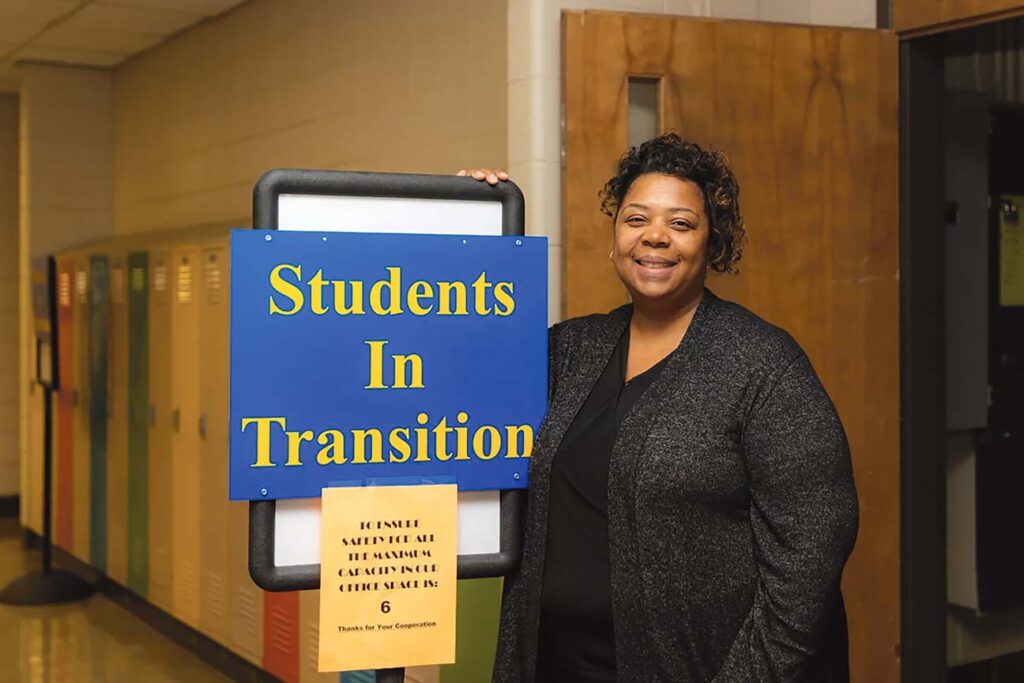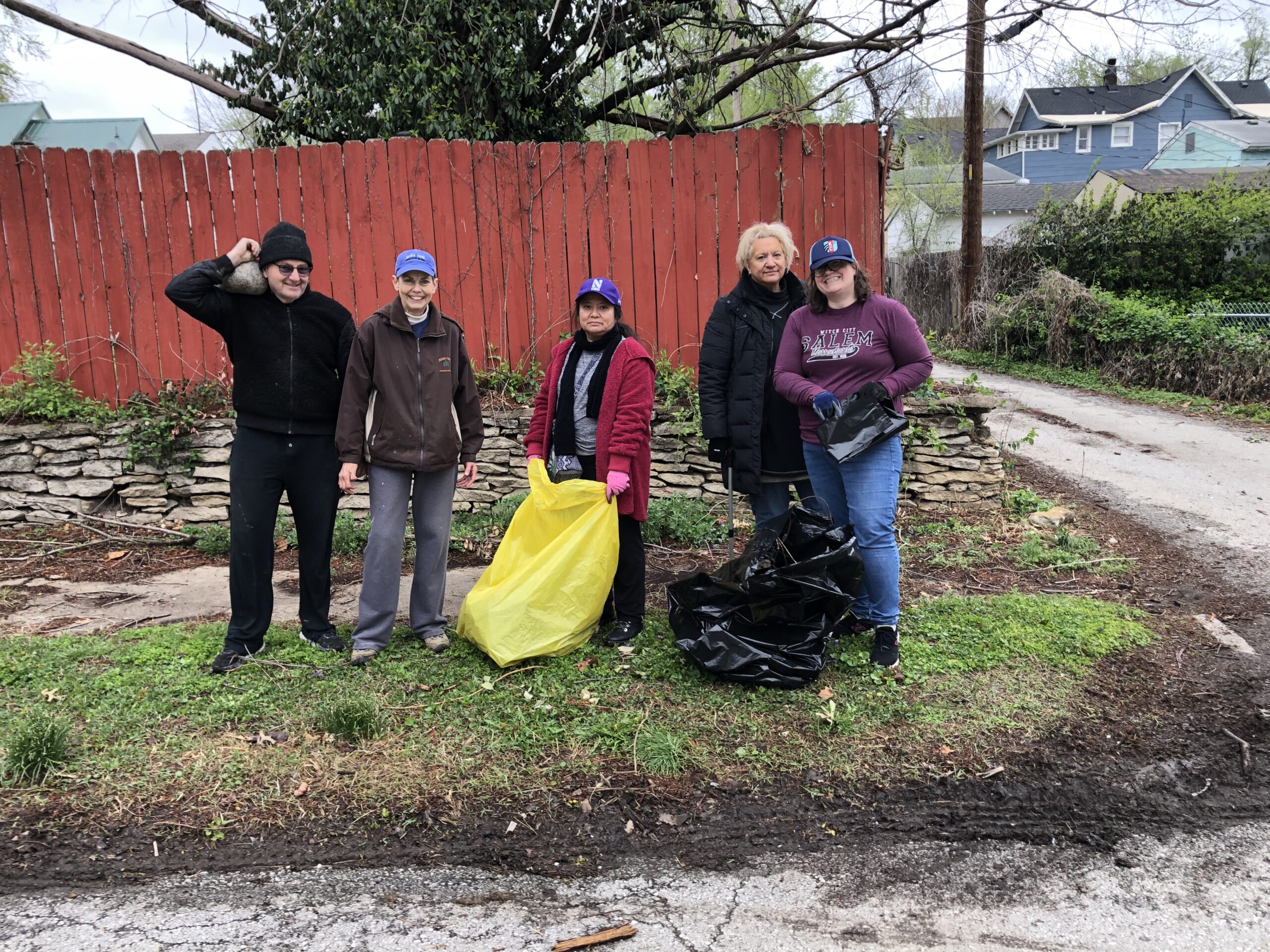Students who lose stable housing can often remain in their previous school, even if they are staying outside its boundaries.

x Zach Bauman/The Beacon
Maria Benevento
Kansas City Beacon
July 13, 2023
Students who don’t have a stable place to live can face a dilemma: Completing high school is a key to escaping housing insecurity, but the instability of being unhoused can disrupt their education.
Federal law aims to protect students’ right to a free public education even if they lack adequate or consistent housing. The McKinney-Vento Homeless Assistance Act ensures that those students are able to enroll in school, aren’t forced to frequently change schools, and receive necessary resources for learning.
School districts must proactively search for students who need resources, but their parent or guardian can also seek help.
“Homelessness is oftentimes hidden,” said Melissa Douglas, the liaison who works with unhoused KCPS students. To find the support students need to succeed, families “will have to come out of the shadows” and contact their district for help.
Here’s what to know to find support for an unhoused student.
Who counts as an unhoused student?
The McKinney-Vento Act defines unhoused students as those who lack a “fixed, regular, and adequate nighttime residence.” That includes unaccompanied youth and those living in shelters, transitional housing, hotels, motels, cars, outdoors, campgrounds or in substandard housing. It also includes students whose family is doubled up with another family in the same residence. Douglas said the latter category is likely the most common in KCPS, which has identified about 1,200 unhoused students.
Missouri school districts identified nearly 33,000 students as unhoused in 2021, said Misty Dothage, director of homeless education with the state Department of Elementary and Secondary Education. Kansas identified more than 7,000 unhoused students during the 2021-22 school year.
How can unhoused students receive services?
Federal law requires school districts to have a liaison to work with students experiencing unstable housing.
State education departments in Missouri and Kansas keep a list of the liaisons for every school district.
Resources
• Missouri Department of Elementary and Secondary Education, Misty Dothage, director of homeless education
573-522-8763
Misty.Dothage@dese.mo.gov
List of homeless liaisons for every Missouri school district
• Kansas City Public Schools Office of Students in Transition
Manual Career and Technical Center
1215 E. Truman Road, Suite 358
Kansas City, MO 64106
816-418-8640
homelessservices@kcpublicschools.org
Parents or guardians can also call the district’s central office or look for the homeless liaison or coordinator on their child’s school district website.
Districts still have to verify a family’s housing situation, Douglas said. Verification could include a letter from a shelter, a motel receipt or a signed affidavit from an adult with whom a family is living.
What enrollment rights do unhoused students have?
Enrollment is expedited for unhoused students. Typical requirements such as proof of residency and immunization records are waived. Unhoused students are also automatically eligible for free school lunch.
District officials determine whether it’s in an unhoused student’s best interest to remain enrolled in the school they most recently attended before losing stable housing, and have transportation provided, even if they move outside the school or district boundaries.
“Best interest” decisions are made in consultation with students’ parents or guardian, Douglas said. Allowing an unhoused student to stay at one school instead of repeatedly transferring may help prevent them from falling behind academically. However, officials may weigh the potentially negative impact of long commutes against allowing an unhoused student to stay at the original school.
What other services can unhoused students receive?
The right to enroll in school includes the right to participate fully, said Barbara Duffield, executive director of SchoolHouse Connection, a national nonprofit organization that views education as the permanent solution to houselessness. Schools should directly address barriers to enrollment, retention and success or refer families to community partners. While the law leaves some specifics up to states and districts, examples include ensuring unhoused students have equal access to special education services, helping with transportation and fees for extracurricular activities, and ensuring students have the clothing and school supplies they need, she said.
“We know that (the) lack of a high school degree or GED is the single greatest risk factor for experiencing homelessness as a young adult,” Duffield said. “Education is going to be what allows that child to obtain a job that pays a living wage to be stably housed.”
KCPS also works with community agencies to help families find safe living situations and move into more permanent housing, Douglas said.
What if an unhoused student is denied services?
Families can appeal to the school district if they believe it wrongly denied them services. The law requires districts to admit the student and provide services while the appeal is resolved.
If denied again, a parent or guardian can appeal to the state. That doesn’t happen often in Missouri, said Dothage, the director of homeless education. But she said she is always accessible to families with questions or concerns, even outside of a formal appeal.
Dothage said she wants to work in partnership with families, students, school districts and charter schools. “Anytime someone is feeling like they’re not getting what they need and what they have a right to receive, then I want them to email or call me.”
Maria Benevento is the education reporter at The Kansas City Beacon. Her reporting is shared with our audience through our partnership with the KC Media Collective, a group of nonprofit news outlets working to better meet community information needs by maximizing resources through new lines of communication, content sharing and collaborative reporting.















